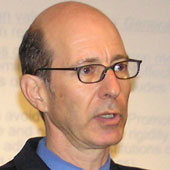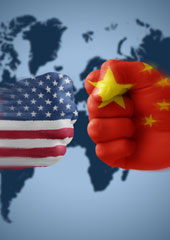Putting Finance Back in the Box
What can be done to make finance serve interests of the real economy?
February 28, 2013
Financial sector reform has been at the center of the post-crisis policy debate but, so far, discussion and legislative action has been almost exclusively about issues of “stability” and preventing a repeat of the crisis.
However, just as important, if not more so, is the effect of financial markets on “equity” and “economic efficiency.” Yet, on these points, the reform debate has been almost totally silent. By restricting the debate to stability, the economic winners have been able to shut down the case for deeper systemic reform.
There is a clear need for deeper reform that makes finance again serve the real economy — rather than having the real economy serve finance. However, such reform is blocked by the political power of finance.
Modern orthodox economics (of the sort practiced by Ph.D.s at top U.S. universities) privileges the standing of financial markets and financial innovation. We live in an age of market worship, and financial markets are claimed to be the most perfect form of markets.
Support for financial markets is then enthusiastically sold on the grounds that they confer special benefits in their role regarding the allocation of capital, the promotion of capital accumulation and growth, the reallocation and spreading of risk, and as an instrument of control over managers and corporations.
My teacher and mentor James Tobin wrote a prescient critique of the supposed functional efficiency of financial markets back in 1984. Tobin noted that financial markets actually finance very little investment. Instead, investment is mostly financed by retained profits.
He also nailed unproductive speculative trading:
I confess to an uneasy physiocratic suspicion, perhaps unbecoming in an academic, that we are throwing more and more of our resources, including the cream of our youth, into activities that generate high private reward disproportionate to their social productivity. I suspect the immense power of the computer is being harnessed to this “paper economy,” not to do the same transactions more economically but to balloon the quantity and variety of financial exchanges.
Another potent critique is that financial markets can lower real economic output to the extent they are just de facto casinos. Why? Because operating the casino uses a lot of real resources.
In 2009, Willem Buiter, now the chief economist at Citigroup, used this betting analogy to show that derivatives market traders are actually irrational.
“I have yet to meet a trader who did not believe that he or she could not beat the market,” Buiter wrote. “Because these traders effectively are the market, they are collectively irrational, as they cannot beat themselves.”
These efficiency critiques of financial markets are supplemented by deeper critiques that seldom get a hearing among conventional economists and policymakers. Hyman Minsky argued that financial markets have a genetic proclivity to boom — bust cycles, a proclivity captured in the aphorism “Success breeds excess breeds failure.”
Financialization
On a broader note, what we are contending with is the phenomenon of “financialization,” which has financial interests dominate the economy and economic policy.
There are three major features of financialization. First, it elevates the significance of the financial sector relative to the real economy. Second, it transfers income from the real sector to the financial sector, increasing the financial sector’s share of GDP. Third, it contributes to wage stagnation and increased income inequality.
Viewed in this light, financialization is at the core of current economic difficulties. Prior to the crisis, the 30-year credit bubble papered over the demand shortage caused by worsening income distribution.
That, in turn, created an unstable financial system that crashed when the credit bubble burst. Now, after the crisis, the economy is stuck in stagnation because of deteriorated income distribution and a structural trade deficit that together undermine aggregate demand.
The challenge is to put finance back in the box so that it again serves the real economy. That requires a series of measures that include further strengthened regulatory controls and prohibitions on finance, a financial transactions tax that discourages speculation, and monetary policy that serves the goals of working families rather than the interests of finance.
This challenge of putting finance back in the box brings us to the question of politics. Success requires winning both the war of ideas and the political contest. It is no good winning the war of ideas if you don’t have political power to implement those ideas.
This connection between ideas and practical politics connects with the issue of “too big to fail.” TBTF is an implicit subsidy to large banks that distorts the market and encourages excessive risk-taking by them. That is because lenders know large banks will not be allowed to fail, and they therefore lend more willingly to those banks on cheaper terms.
However, TBTF finance is not just an economic problem. It is also a massive political obstacle. That is because the financial industry uses its wealth and influence to block change by lobbying the U.S. Congress, if not effectively buying it outright. That makes TBTF finance a danger to democracy, and not just the economy.
The economic evidence clearly supports the financialization story. We know what policies are needed to put finance back in the box. But this will only happen if ordinary people become politically engaged and overcome the political power of finance.
The financial industry is strong the world over, but nowhere more so than in the United States. Given the all-too-close intertwining between political interests and the finance industry (especially in the U.S. Congress), it is illusory to hope that global reform will be led from Washington.
It is far more likely that the United States, in part because of toxic campaign finance feedback loops, will be the last big economy to see the light in the battle between finance and the real economy.
That places a special burden on other nations and regions, particularly the European Union. Only if the European Commission and European Parliament stand up and show grit and determination is there any real hope for progress.
Thomas I. Palley’s latest book, From Financial Crisis to Stagnation: The Destruction of Shared Prosperity and the Role of Economics, was released earlier this month in paperback by Cambridge University Press.
Takeaways
With their entrenched political influence, too big to fail banks are a grave danger to democracy, not just the economy.
By restricting the debate to stability, the economic winners of the financial crisis have been able to shut down the case for deeper systemic reform.
Financial markets actually finance very little investment. Instead, much of their activity is speculative.
The U.S. will be the last big economy to see the light in the battle between finance and the real economy.

